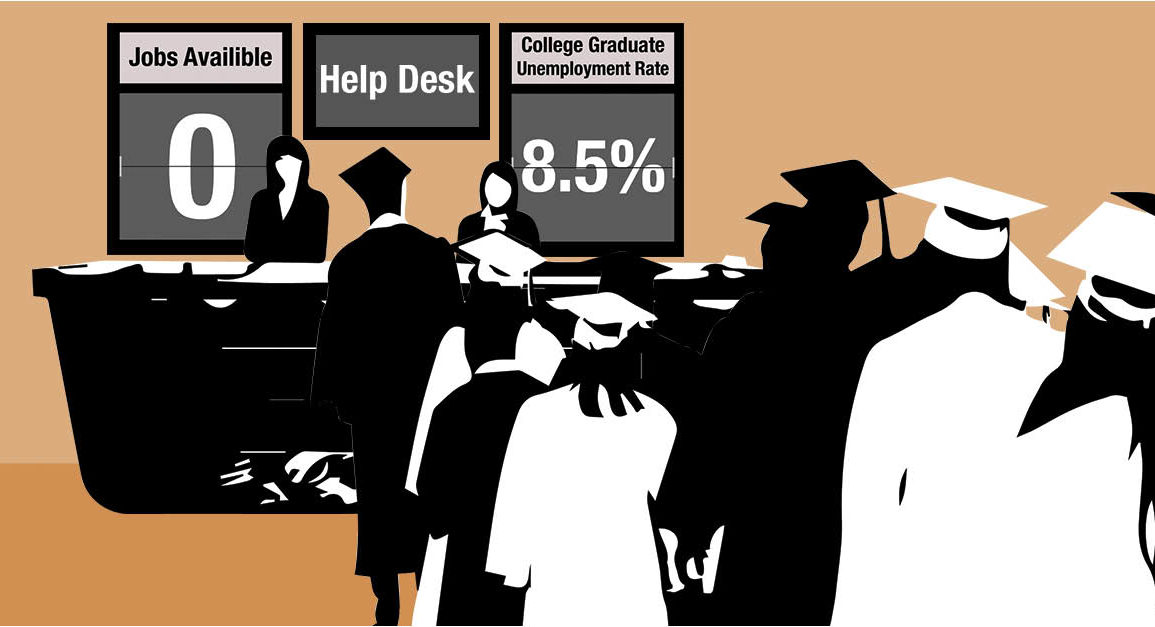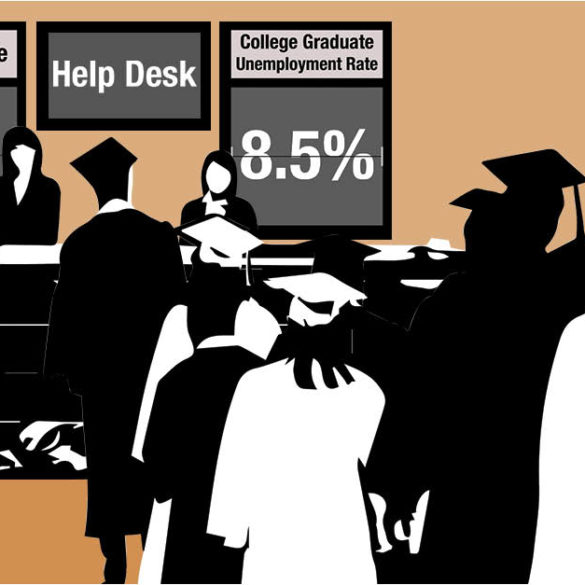Evan Andreae sat in his three-and-a-half-hour lab for organic chemistry last spring knowing how unhappy he was. While the other chemistry majors around him worked diligently on their latest lab, the realization dawned on him that he couldn’t go through his life doing something that he wasn’t passionate about.
Evan, a fifth year senior, has changed his major twice, entering his freshman year as a music technology major, switching to chemistry right before his junior year.
He remembers the countless meetings he sat through when deciding to switch his major for a third time. His plan was to try to go for an English degree, to steer far away from anything related to math. However, with the credits he had accumulated in four years, an English degree wasn’t going to work.
Evan and his advisors finally came to a conclusion: a general studies major with a double minor in professional writing and philosophy.
By the end of last spring, Evan had changed his major and applied for a public relations internship with the English department at Ball State. By the time he was ready to pack up his things and head out for summer vacation, the internship was secured, which would be the stepping stones of Evan figuring out exactly what type of career he wanted.
Seventy-two percent of 2015 graduates said in a recent study by Accenture Strategy that they completed an internship, apprenticeship or co-op.
Jim McAtee, Ball State Career Center Director, said graduates need to understand that transferrable skills have a large impact, something that Evan has learned greatly. Since Evan has started his internship with the English department, he has gained many skills that don’t associate with his major and minors. His knowledge of graphic design has grown along with his marketing skills, both being areas of interest to him. To Evan, it is all about the skills you have rather than what you major in.
I wish I had started out in this, Evan continuously thought as he spent last semester doing something he finally enjoyed.
A large majority of companies say they are more likely to hire someone who has had experience, according to a study done by Hart Research. First semester senior and criminal justice major Ramona Simmons is realizing this as she is finding it hard to secure a job with no experience on her resume`.
Last year, Ramona joined one of Ball State’s immersive learning projects. The project was centered on field research for criminal justice majors, a trip to Ferguson, Missouri for a week tacked onto the itinerary.
The group went door to door asking random strangers in Ferguson to speak to them about the events that happened with the Michael Brown case. It was the moment their professor met an older black woman in a convenience store and asked her to speak to his students that was a turning point for Ramona.
It was the group’s last interview of the day, the sun was setting off in the distance. Each of the four students sat on the woman’s porch steps, speaking about the Michael Brown case. The woman became so engrossed in what she was telling the group, leaning forward in her seat and wiping her palms on her legs. Tears began to fall from the woman’s eyes. The power of what she was saying caused Ramona to cry as well.
This was the moment that Ramona knew she wanted to help people; what she didn’t know was that it would be so difficult to find a job in the field she had chosen.
Only 64 percent of college graduates are working in their field of study, according to a survey taken by Accenture Strategy. Ramona and Evan have both come to the sudden horror that they may not find a career right away in the field they have chosen.
Jim disagrees with Accenture Strategy’s report that fewer students are finding a career in their major. Jim said that according to Ball State’s First Destination Survey, 81 percent of Ball State graduates are employed in their study.

In May 2013, the United States had an unemployment rate of 7.5 percent, according to the Bureau of Labor Statistics. That rate has dropped two percent in the last two years, something that Jim points out. Last year’s percent is the lowest unemployment rate in the last seven graduating classes.
I could see my mom giving this same interview, Ramona thought as she sat on the steps. The project hit home with Ramona, being African American, and the words that the older woman spoke resonated within her. “Oh my gosh, this could be my mother that people are interviewing about me,” she said she thought.
Eighty percent of students questioned in the Accenture Strategy study said that they were well educated for the workforce. However, 49 percent of 2013/2014 graduates in the same study believe that they are underemployed. Evan and Ramona are both facing this problem as graduation looms ahead and application after application has been sent out.
Evan has sent out around 20 applications to a variety of graphic design and marketing positions in hopes that one will finally be the place that he ends up at.
“If I send out a bunch, one of them has to be the right place.” he said he thought as he continued to search for positions and complete applications. He looks at it as a probability standpoint. The more he sends out, the better chance he thinks he will have.
However, those 20-some applications have received very few call backs for interviews. And the companies that have showed interest in Evan, turn him down after the interview process.
Ramona has sent about five applications, her problem being actually finding a research position in criminal justice close to her hometown.
Ramona feels that a large part of securing a job comes with making connections. She feels that it is all about who is going to write her a recommendation letter to give her that extra push in finding a position. Employers are using internship programs as hiring funnels, according to Jim. Employers want to hire people that already know their corporate culture, much like with Evan’s internship.
“The first job out of college does not dictate the rest of your life,” Jim said. He said it is mainly about the skills you acquire in the jobs you have and not letting that first position you get define you.
Ramona has two windows opened up on her computer consistently. It’s around midnight on a Thursday and she is supposed to be doing homework that is due the next day. One tab is dedicated toward her homework, the other is dedicated on her job hunt. Accidentally clicking on the job hunt tab, she became overwhelmed.
She frantically started looking over her resume, searching for ways to improve it. She created new versions of her resume and searched harder for more places to apply.
The underlying fear of being a failure took over her thoughts. She was afraid of her dreams being postponed due to a job not lining up. The longer it takes to get a job, the longer it will take to go to grad school, Ramona said she thought that night. These thoughts cloud Ramona’s thoughts daily.
Evan hasn’t had a moment like this yet. Only having about nine months experience in the field he wants to go into, Evan tried to go into his job hunt expecting more “no’s” than “yes’s.”
He remembers the emails he has received in the past couple months telling him he didn’t get the job. There are the emails that go into detail and tell him what he is missing and what he needs to do to be at their standard. Then there are the emails that have brushed him off with: “You don’t fit our needs at this time. Thanks.”
Evan said that there have been some points where he has gotten frustrated and thought Okay, can I get some sort of approval here? But, he doesn’t think every “no” is bad.
“No matter what job you’re applying for you have to keep the mindset that there are a lot of people probably applying for the same position,” Evan said. “It’s more competitive than it’s ever been.”




